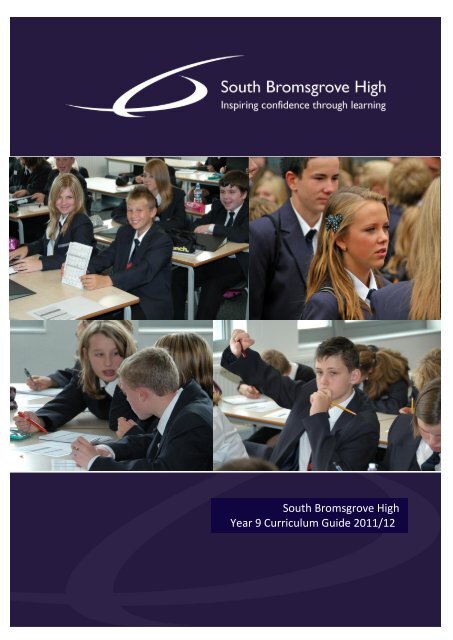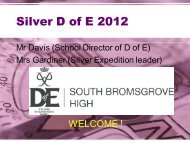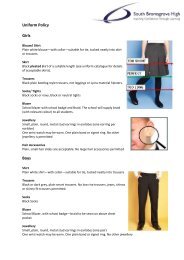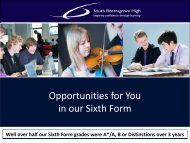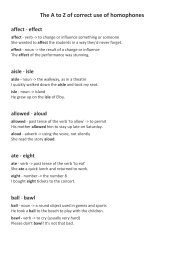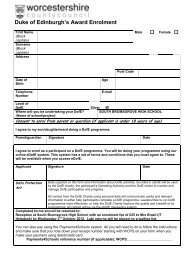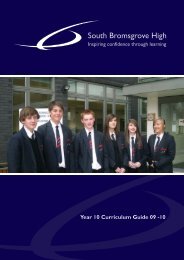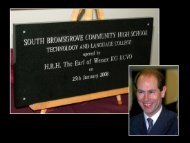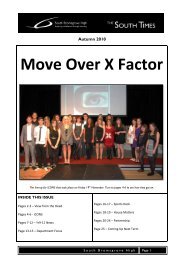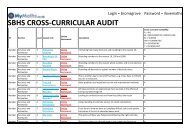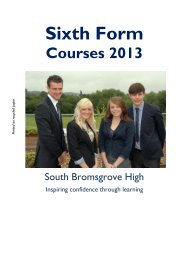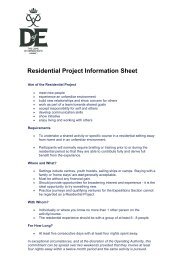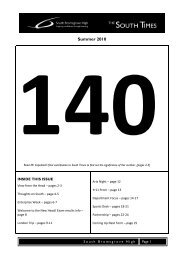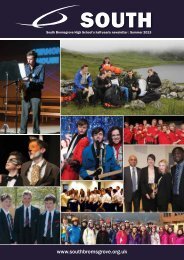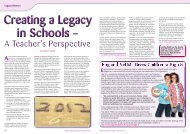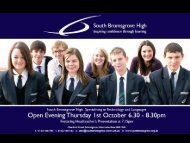South Bromsgrove High Year 9 Curriculum Guide 2011/12
South Bromsgrove High Year 9 Curriculum Guide 2011/12
South Bromsgrove High Year 9 Curriculum Guide 2011/12
Create successful ePaper yourself
Turn your PDF publications into a flip-book with our unique Google optimized e-Paper software.
<strong>South</strong> <strong>Bromsgrove</strong> <strong>High</strong><br />
<strong>Year</strong> 9 <strong>Curriculum</strong> <strong>Guide</strong> <strong>2011</strong>/<strong>12</strong>
<strong>Year</strong> Nine <strong>Curriculum</strong> <strong>Guide</strong> <strong>2011</strong>-<strong>12</strong><br />
July <strong>2011</strong><br />
Dear Parent / Guardian,<br />
As a parent of a <strong>Year</strong> 9 student, trying to support your son/daughter as he/she moves to<br />
<strong>High</strong> School can sometimes seem quite difficult.<br />
To try to help with this we have put together a curriculum guide containing essential<br />
information for parents of <strong>Year</strong> 9 students.<br />
Please try to find time to go through this booklet.<br />
The following general points may be of help:<br />
<br />
<br />
<br />
<br />
<br />
Parental support for students with homework, coursework and revision improves<br />
students’ GCSE results. Some GCSE courses will be started in <strong>Year</strong> 9.<br />
Students who have a study habit at home are more likely to reach their potential.<br />
If you have any concerns regarding your child’s progress in a subject there are<br />
consultation evenings every half term where you can make appointments to meet<br />
staff.<br />
Teenagers frequently ‘put things off’. Their organisational skills are not fully<br />
developed and they need advice, guidance and sometimes a firm approach to reach<br />
their potential.<br />
The planner for recording homework should be signed by parents weekly. Check<br />
that your child is recording homework – and have a look at his/her exercise books as<br />
well.<br />
<strong>Year</strong> 9 <strong>Curriculum</strong> Booklet:<br />
This booklet gives you important information and tips to help your child achieve his/her<br />
potential. It tells you:<br />
‣ What is expected in each subject and how you can help<br />
‣ An overview of the reporting and consultation system so you can keep a track of<br />
your child’s progress<br />
‣ Key dates for your diary<br />
Yours sincerely<br />
L.J. Colley
<strong>Year</strong> Nine <strong>Curriculum</strong> <strong>Guide</strong> <strong>2011</strong>-<strong>12</strong><br />
CONTENTS<br />
SUBJECT OUTLINES Page 2 - 18<br />
PASTORAL CURRICULUM Page 19 - 20<br />
THE REPORTING SYSTEM AND ASSESSMENT Page 21 - 22<br />
HOMEWORK Page 23 - 24<br />
ICT ACROSS THE SCHOOL Page 25 - 26<br />
REWARDS SYSTEM Page 27- 28<br />
THE HOUSE SYSTEM Page 29 - 30<br />
ELECTRONIC PARENTAL MONITORING Page 31 - 32<br />
CONSULTATION EVENINGS Page 33 - 34<br />
KEY DATES FOR YOUR DIARY Page 35 - 36<br />
1
<strong>Year</strong> Nine <strong>Curriculum</strong> <strong>Guide</strong> <strong>2011</strong>-<strong>12</strong><br />
SUBJECT<br />
OUTLINES<br />
2
<strong>Year</strong> Nine <strong>Curriculum</strong> <strong>Guide</strong> <strong>2011</strong>-<strong>12</strong><br />
Art<br />
<strong>Curriculum</strong> Coordinator<br />
Mrs N Taylor<br />
What we will teach your child:<br />
In Art students will explore visual experiences to communicate ideas and meanings. They will work<br />
with a variety of materials, developing confidence, competence, imagination and creativity.<br />
Students will also reflect critically on their own work and other people’s work, developing an<br />
appreciation of art, craft and design.<br />
During the year students will have the opportunity to develop ideas around specific themes inspired<br />
by looking at the work of a range of artists. Students will practise drawing techniques and explore<br />
ideas through paint, print, collage and pastels.<br />
There will also be an opportunity to work on a large scale group project in the summer term.<br />
How you can support your child:<br />
<br />
<br />
<br />
Provide a suitable area for extended homework tasks<br />
Encourage your child to use their time wisely when planning and making. Marks will be<br />
given for the creative use of materials - so be prepared to offer ideas.<br />
Be aware of all homework deadlines.<br />
Supportive resources / websites / visits:<br />
<br />
<br />
<br />
Key subject information including relevant coursework deadlines:<br />
Assessment is a vital part of the Art <strong>Curriculum</strong>. Students are continuously assessed using a variety<br />
of different means. Students can always expect verbal feedback during their art lesson. Each piece<br />
of class work and homework will be marked and grades and levels are recorded on the front of the<br />
students’ folder which can be accessed by all. Students will have the opportunity to demonstrate<br />
areas of improvement as their work develops.<br />
Homework Expectations:<br />
Homework will be set when appropriate and will always compliment the unit of work.<br />
<br />
There is a wealth of ideas in the work of other artists and the internet will be a useful tool<br />
for development.<br />
Websites will vary according to the artists being studied and students will be given suitable<br />
web addresses for each task.<br />
Students are often very resourceful when planning what materials to use for creative homework’s.<br />
Students will be given deadline dates as the length of time allocated for each homework<br />
will depend on the task set. (Deadlines for homework’s can be accessed via<br />
Moodle/Technology/Art/Yr9).<br />
3
<strong>Year</strong> Nine <strong>Curriculum</strong> <strong>Guide</strong> <strong>2011</strong>-<strong>12</strong><br />
Biology<br />
<strong>Curriculum</strong> Coordinator<br />
Mr N Coates<br />
What we will teach your child:<br />
Half Term 1 – Interdependence: Students venture into the outdoors and learn about the importance<br />
of plants and the processes that take place within them.<br />
Half Term 2 – Cells: Students study the building blocks of animals and plant life.<br />
Half Term 3 – Fit and Healthy: Students study the different aspects of maintaining a healthy<br />
lifestyle.<br />
Half Term 4 – The Genetic Code: Students study different aspects of DNA such as inheritance and<br />
DNA technology.<br />
Half Terms 5+6 – Start of GCSE course.<br />
How you can support your child:<br />
Homework will be set each week, so please check your child’s planner and ensure that he/she has<br />
completed it. Homework activities will often require research of some description so access to the<br />
internet would be of benefit.<br />
Supportive resources / websites / visits:<br />
<br />
<br />
http://www.bbc.co.uk/schools/ks3bitesize/science<br />
http://www.bbc.co.uk/schools/gcsebitesize/science/<br />
Key subject information including relevant coursework deadlines:<br />
Your child will be assessed through regular marking of their exercise book and homework activities.<br />
Additionally, students will complete a tiered (Level 3-6 or 5-7) unit test in each of the four units.<br />
Homework Expectations:<br />
Homework will be set on a weekly basis. A variety of homework tasks will be set and should be<br />
recorded in your child’s planner.<br />
4
<strong>Year</strong> Nine <strong>Curriculum</strong> <strong>Guide</strong> <strong>2011</strong>-<strong>12</strong><br />
Chemistry<br />
<strong>Curriculum</strong> Coordinator<br />
Ms G Scutt<br />
What we will teach your child:<br />
<br />
Term 1 – Chemical reactions<br />
o Looking at the reactions of metals and their compounds with other chemicals<br />
<br />
Term 2 – Using Chemistry<br />
o How chemistry is used in industry and the home<br />
<br />
Term 3 – Start the GCSE Gateway Science Course<br />
How you can support your child:<br />
<br />
<br />
<br />
Look through their exercise books asking them to explain key concepts to you (you don’t<br />
need to know the science, but they should be able to explain it to you, if they can’t then<br />
they need to ask their teacher)<br />
Encourage them to discuss science items they see in the news<br />
Help them to revise in preparation for tests<br />
Supportive resources / websites / visits:<br />
<br />
<br />
www.docbrown.info – comprehensive chemistry revision notes and exercises<br />
http://www.bbc.co.uk/schools/gcsebitesize/science/ - excellent revision material<br />
Key subject information including relevant coursework deadlines:<br />
<br />
<br />
Tests will occur in the middle and end of each module<br />
A KS3 level (between 3 and 7) will be achieved by your child.<br />
Homework Expectations:<br />
Homework will be set on a weekly basis. A variety of homework tasks will be set and should be<br />
recorded in your child’s planner.<br />
5
<strong>Year</strong> Nine <strong>Curriculum</strong> <strong>Guide</strong> <strong>2011</strong>-<strong>12</strong><br />
Design Technology<br />
<strong>Curriculum</strong> Coordinator<br />
Mr P H Clifton<br />
What we will teach your child:<br />
All <strong>Year</strong> Nine students will follow a range of modules linked to the Design Technology Key Stage<br />
Three National <strong>Curriculum</strong> with modules in 3D Design, Food, Graphics and Textiles. Each of these<br />
modules will cover the key themes of Investigating and Developing Ideas, Communicating Ideas,<br />
Planning, Making and Evaluating and all modules will include a practical dimension in which<br />
students will be able to display their creativity and practical skills. Each unit will be assessed<br />
independently with key assessments linked to the Y9 KAR.<br />
Key subject information:<br />
3D Design – Students will develop a range of Design, Graphics and Practical skills. These will be<br />
covered by carrying out a Design and Make Project based on a digital clock.<br />
Food – Students will develop an understanding of healthy eating and basic nutrition and will be<br />
equipped with the skills to successfully prepare their own meals. They will analyse their own diets,<br />
understand how to prepare, cook and store food safely and how to present and garnish food to give<br />
it the wow factor.<br />
Textiles – Students will develop their research skills producing a mood-board and carrying out<br />
existing product analysis. They will plan their individual order of work to meet deadlines and<br />
develop a range of practical skills including the use of a sewing machine. At the end of the unit<br />
students will test and evaluate their finished product.<br />
Graphics – Students will develop a range of practical 2D Graphics skills across a range of media<br />
including computer graphics. They will plan, design, make and evaluate a range of graphics output<br />
according to a brief given to them.<br />
Homework Expectations and how you can support your child:<br />
<br />
<br />
<br />
<br />
Homeworks will be given to back up the design and practical work within modules.<br />
Students will be required to research in preparation for given projects and source required<br />
materials for specified practical work.<br />
Students will often be expected to do some of the preparation for their practical work at<br />
home and parents are encouraged to support students in the completion of this work.<br />
Parental support is sought to encourage all students to come to Design Technology fully<br />
prepared with all required lesson materials and practical resources.<br />
Supportive resources / websites / visits:<br />
<br />
<br />
Useful web sites: www.technologystudent.com<br />
6<br />
We will endeavour to make our modules as active as possible with regular opportunities to<br />
research the work of others and learn from real life situations.
<strong>Year</strong> Nine <strong>Curriculum</strong> <strong>Guide</strong> <strong>2011</strong>-<strong>12</strong><br />
Subject :<br />
Drama<br />
Name of co-ordinator: Mr Sugars<br />
What we will teach your child: Students will be taught a range of drama skills over the course,<br />
with a focus on improvisation, response to text and the development of their ability to communicate<br />
in a range of contexts. Building confidence is also at the heart of our course. In the Autumn term<br />
students will build their improvisation skills, exploring a range of theatre forms and styles in<br />
preparation for a performance based on thematic work. In the Spring term we will work<br />
collaboratively on dramatic responses to script, interpreting and developing a character, exploring the<br />
roles of actor, director and designer and working towards group performances of scripted scenes.<br />
The Summer term will focus on the creation of a devised performance, incorporating knowledge and<br />
skills accumulated throughout the course and based on research material and texts.<br />
How you can support your child:<br />
<br />
<br />
<br />
Provide a suitable area for extended homework tasks<br />
Be aware of all homework deadlines.<br />
View and offer opinions on practical and written work.<br />
Supportive resources / websites / visits<br />
<br />
<br />
Theatre visits / opportunities to see live performances<br />
Involvement in extra-curricular drama<br />
Key subject information including relevant coursework deadlines:<br />
<br />
<br />
<br />
Students will be assessed on their practical work through their final performance, but also<br />
through collaborative teamwork during the creation of their pieces.<br />
Written work will be completed and assessed throughout the course in response to<br />
preparations for practical coursework.<br />
Students will also be expected to produce an on-going record of their drama work through<br />
entries in their drama logbook.<br />
<br />
Homework Expectations:<br />
<br />
<br />
Homework will be set on a regular basis and will always complement the unit of work.<br />
Homework will encompass a range of tasks including written work and practical tasks as well as<br />
7
<strong>Year</strong> Nine <strong>Curriculum</strong> <strong>Guide</strong> <strong>2011</strong>-<strong>12</strong><br />
English<br />
<strong>Curriculum</strong> Coordinator<br />
Mrs Jackson<br />
What we will teach your child:<br />
<br />
<br />
<br />
Autumn Term: A whole novel, a variety of poems and non-fiction texts. Students also write<br />
their own poetry, short stories and non-fiction texts.<br />
Spring Term: A detailed study of Shakespeare’s “The Tempest.” Students watch the play in<br />
performance by a visiting theatre group.<br />
Summer Term: We begin AQA Syllabus GCSE English Language Unit B (15%). Students<br />
complete two controlled assessments by the end of the term. Firstly, all students study the<br />
film, “The Truman Show;” secondly, the students either write a newspaper column under<br />
the heading, “Don’t Get me Started On…” or a response in any format based on the theme<br />
of “Change.”<br />
How you can support your child:<br />
<br />
<br />
<br />
You can support your child by encouraging their interest in English.<br />
Please take an active interest in their work by asking them about their homework, looking<br />
at their exercise books and discussing what they are learning.<br />
Most importantly, encourage your child to read. This can be a range of genres from books<br />
to magazines.<br />
Supportive resources / websites / visits:<br />
<br />
<br />
<br />
<br />
The School Learn Centre book borrowing service<br />
www.bbc.bitesize.com<br />
Shared Documents and Moodle<br />
The AQA English web-site<br />
Key subject information including relevant coursework deadlines:<br />
<br />
At the start of year 9 every student completes an original writing assignment for<br />
assessment of their writing skills. They also sit a short reading test to assess their reading<br />
age.<br />
In the Summer Term two controlled tests are graded from A* - G following the syllabus<br />
criteria and contribute 15% towards their final grade in GCSE English Language.<br />
Homework Expectations:<br />
<br />
<br />
<br />
All <strong>Year</strong> 9 students are expected to complete a weekly reading homework.<br />
Writing homework is set weekly or periodically as appropriate. It is particularly important in<br />
preparation for class based controlled assessments.<br />
Students are regularly set reading, writing and research tasks to consolidate their learning.<br />
8
<strong>Year</strong> Nine <strong>Curriculum</strong> <strong>Guide</strong> <strong>2011</strong>-<strong>12</strong><br />
Subject Geography <strong>Curriculum</strong> Coordinator<br />
Mr Medlicott<br />
What we will teach your child: A broad range of Human and Physical Geography<br />
topics will be studied including; USA, Environmental Disasters, Powerful<br />
nations, The Olympics and How Safe is Britain? These units are designed to<br />
provide the key skills required to study Geography beyond <strong>Year</strong> Nine if desired.<br />
How you can support your child:<br />
<br />
Your son / daughter would benefit from support when completing key assessments at<br />
home. Particular guidance could be required when using the internet for research.<br />
Discussing Geographical issues and topics also promotes a deeper level of<br />
understanding.<br />
Supportive resources / websites / visits<br />
<br />
It is advisable to watch the news on a regular basis to build an appreciation of issues at<br />
a local, regional and national scale. Reading a local or national newspaper to identify<br />
Geographical themes is also worthwhile.<br />
Key subject information including relevant coursework deadlines:<br />
<br />
The course does not contain coursework. Assessments will be set for each unit of study<br />
which will be level marked and returned with guidance to help your son / daughter<br />
make improvements and increase their level of understanding.<br />
Homework Expectations: Homework will be set when required and will link to<br />
the key assessment for each unit.<br />
9
<strong>Year</strong> Nine <strong>Curriculum</strong> <strong>Guide</strong> <strong>2011</strong>-<strong>12</strong><br />
History<br />
<strong>Curriculum</strong> Coordinator<br />
Mrs Taylor<br />
What we will teach your child:<br />
Students will be taught about aspects of British and World History from 1800 to the present day.<br />
During the Autumn term students will examine significant changes and events in world conflict<br />
during the past century. They will gain an understanding of significant changes and events in the<br />
twentieth century and how these have impacted on peoples’ lives, beliefs and attitudes. Students<br />
will also study developments in the history of medicine and surgery as part of a thinking skills<br />
project.<br />
In the Spring term students will opt for their GCSE in History and will begin a course that will have<br />
been carefully selected to enable them to achieve the best result possible.<br />
How you can support your child:<br />
You can support your child by encouraging their interest in History. Please take an active interest in<br />
their work by asking them about their homework, looking at their exercise books and discussing<br />
what they are learning about in class.<br />
Supportive resources / websites / visits:<br />
www.bbc.co.uk/schools/gcsebitesize/history<br />
www.johndclare.net<br />
http://sbhshistory.podomatic.com/<br />
www.spartacus.schoolnet.co.uk<br />
Key subject information including relevant coursework deadlines:<br />
Assessment is an integral part of the History <strong>Curriculum</strong>. Students are continually assessed using a<br />
variety of different means. Students can expect one formal written assessment each half term.<br />
Each assignment will assess a particular skill. Students will be provided with detailed written and<br />
verbal feedback and will have the opportunity to demonstrate areas of improvement.<br />
Homework Expectations:<br />
Homework tasks will be set, as and when appropriate. These will include personal research, task<br />
completion and revision for internal assessments.<br />
10
<strong>Year</strong> Nine <strong>Curriculum</strong> <strong>Guide</strong> <strong>2011</strong>-<strong>12</strong><br />
ICT<br />
<strong>Curriculum</strong> Coordinator<br />
What we will teach your child:<br />
Students in <strong>Year</strong> Nine are following the final year of their KS3 ICT National <strong>Curriculum</strong>. More<br />
significantly pupils are also beginning work on an ICT OCR National qualification and will complete<br />
units that contribute towards a GCSE equivalent qualification by the end of <strong>Year</strong> Ten. The course is<br />
assessed at Pass, Merit or Distinction.<br />
The Units followed in <strong>Year</strong> Nine will be:<br />
Unit 1: Skills for Business<br />
Unit 21: Creating Web Graphics<br />
How you can support your child:<br />
All of the work linked to the units identified above is covered in class in Y9 ICT lessons and is<br />
listed on the school’s Moodle ICT website. Please visit the Moodle site and examine the<br />
materials - all students have their own access, and will be able to show you how the site<br />
works.<br />
<br />
<br />
Please discuss the Moodle site with your child and find out what their understanding is. If<br />
you feel that your student needs more information, please do not hesitate to contact the<br />
school.<br />
If your child does experience problems in ICT, please encourage them to discuss any issues<br />
that they might have with their teacher or, if you prefer, feel free to contact the teacher<br />
directly using the school’s contact information.<br />
Supportive resources / websites:<br />
Individual Assessment Criteria sheets for each unit. These sheets are the essential checklist<br />
for students. We will supply your child with a checklist for each unit.<br />
<br />
http://www.ocrnationals.com/ This has an overview of the OCR Nationals and the ICT<br />
course in particular, and explains their value in GCSE terms.<br />
Key subject information including relevant coursework deadlines:<br />
There is no KS3 test in ICT and no examination for the ICT OCR National.<br />
All assessment is based on portfolio evidence and the ICT work completed in Y9 and Y10.<br />
<br />
<br />
<br />
Each of the units completed in Y9 has an assessment sheet detailing the evidence required<br />
– these are available on Moodle.<br />
Depending on the evidence produced and the assessment criteria met, pupils will be<br />
awarded a Pass, Merit or Distinction for their work.<br />
Students who do not produce the work required will not achieve a Pass.<br />
Homework Expectations:<br />
<br />
All tasks linked to completion of the ICT OCR National will be available on Moodle. These<br />
tasks will obviously be undertaken in class but students will be expected to use homework<br />
time each week for completion.<br />
All completed work will need to be uploaded on Moodle.<br />
11<br />
Mr Clifton
<strong>Year</strong> Nine <strong>Curriculum</strong> <strong>Guide</strong> <strong>2011</strong>-<strong>12</strong><br />
Mathematics<br />
<strong>Curriculum</strong> Coordinator<br />
What we will teach your child:<br />
<br />
<br />
<br />
Miss S Rowing<br />
A variety of mathematical techniques from the Number, Algebra, Shape and Space and<br />
Handling Data strands of the GCSE Mathematics curriculum.<br />
How to apply these in different situations, particularly in the examination context.<br />
We will start the GCSE course in year 9 and aim to complete two units. Students will do a<br />
further unit in year 10, thus completing GCSE at the end of year 10.<br />
We will provide the opportunity for improvement and further development in year 11.<br />
How you can support your child:<br />
<br />
<br />
<br />
Show enthusiasm for Mathematics! Point out how important Mathematics is – not only as<br />
a qualification in itself, but also as something that is essential in everyday life.<br />
Have a look at his/her exercise books and talk about how he/she is progressing. Look for<br />
the ‘traffic light’ marking done by the teacher. What does he/she need to do to improve?<br />
Ensure your son/daughter is properly equipped for lessons. This includes having a pen,<br />
pencil, exercise book, textbook and importantly a CALCULATOR!<br />
Supportive Resources/websites/visits:<br />
<br />
www.mymaths.co.uk is an excellent resource which reinforces the work done in class.<br />
Access is available via login = <strong>Bromsgrove</strong> and Password = ilovemaths. Each student has<br />
his/her own personal login/ password which allows them to track his/her own progress.<br />
Key subject information including relevant coursework deadlines:<br />
<br />
The course is modular, students take Units A, B, C. Units A and B are worth 25% of the<br />
GCSE and Unit C 50%. There is no coursework.<br />
Units A and B will be done in year 9 and Units C at the end of year 10.<br />
Calculators are allowed in Units A and C, but not B.<br />
<br />
The module examination sessions are in November, January and June.<br />
Homework Expectations:<br />
<br />
<br />
Homework will be set on average about once per week. It may be set more than this<br />
during intensive periods, such as when preparing for module examinations and conversely,<br />
less at other periods in the year. The teacher will decide what best suits the needs of the<br />
class.<br />
Tasks may be varied – practice exercises, learning formulae, mymaths tasks, designing a<br />
poster, doing research from the internet, preparing for recap tests and module exams.<br />
<strong>12</strong>
MFL<br />
<strong>Year</strong> Nine <strong>Curriculum</strong> <strong>Guide</strong> <strong>2011</strong>-<strong>12</strong><br />
<strong>Curriculum</strong> Coordinator<br />
Mr J Siddle<br />
What we will teach your child:<br />
In Modern Foreign Languages we will continue to build upon the skills which your child has developed<br />
through their language learning at Middle School.<br />
All students will continue their study of French in the first half term of <strong>Year</strong> 9 with German introduced as an<br />
additional language in upper-band groups and Spanish in middle-band groups. At the end of the first half<br />
term, students will be asked to express a preference about which language they wish to take to GCSE. After<br />
careful consultation and on the recommendation of their teachers, students will begin their GCSE course<br />
after the autumn half term.<br />
How you can support your child:<br />
You can support your child by encouraging their interest in Languages. Please take an active interest in<br />
their work by asking them about their homework, looking at their exercise books and discussing what they<br />
are learning. They will receive at least 1 learning homework per week and testing your child on a regular<br />
basis at home will be extremely beneficial to their vocabulary learning. We also recommend students buy a<br />
good foreign language dictionary once they’ve started their GCSE course.<br />
Supportive Resources/websites/visits:<br />
These websites will support your homework (some will need a password which is available from languages<br />
teachers)<br />
Languages on-line (http://atschool.eduweb.co.uk/rgshiwyc/school/curric/HotPotatoes/index.htm)<br />
Linguascope (www.linguascope.com)<br />
Key subject information including relevant coursework deadlines:<br />
Assessment is an integral part of the MFL curriculum. Students are continually assessed using a variety of<br />
means. Students can expect a Feed-Forward Assessment in the middle of each half term, where they will<br />
be given targets on how they can improve. At the end of each half term students will complete a Key<br />
Assessment which will graded using GCSE criteria..<br />
Homework Expectations:<br />
Homework will be set regularly and will reinforce the learning done in class.<br />
All students will be set one vocabulary learning homework each week which will be followed up with a<br />
vocabulary test.<br />
Additional weekly homework tasks will focus on speaking, listening, reading or writing and may include:<br />
o<br />
o<br />
o<br />
o<br />
reading or listening exercises<br />
preparation of oral presentations and conversations<br />
grammar exercises<br />
writing short texts/paragraphs<br />
At least once per half-term students will be set a piece of extended writing, usually their Key Assessment.<br />
13
<strong>Year</strong> Nine <strong>Curriculum</strong> <strong>Guide</strong> <strong>2011</strong>-<strong>12</strong><br />
Music<br />
<strong>Curriculum</strong> Coordinator<br />
Mr Cobon<br />
What we will teach your child:<br />
<br />
Students will be taught performing, composing and listening skills through a range of<br />
activities. The Autumn term has a focus on structure and musical devices which are studied<br />
via a range of musical styles. This first term also includes a brief introduction to music<br />
technology . Spring term has a focus of music and media and examines the power of music<br />
to support the moving image and also looks at how music can create a range of feelings.<br />
Lastly the Summer term studies the development of pop and rock music as students start to<br />
develop their own rock or pop composition.<br />
How you can support your child:<br />
<br />
<br />
Provide a suitable area for homework and revision<br />
Encourage revision via the school VLE<br />
Supportive resources / websites / visits:<br />
<br />
<br />
http://moodle.southbromsgrove.worcs.sch.uk/<br />
http://www.southbromsgrove.worcs.sch.uk/music/<br />
<br />
Key subject information including relevant coursework deadlines:<br />
<br />
Students are continually assessed using a variety of different means. Class listening tests<br />
and homework tasks are instantly marked with immediate feedback for the student.<br />
Performing and composition tasks are continually assessed.<br />
Homework Expectations:<br />
<br />
Homework is every fortnight. Due to the nature of the subject this is set mostly as online<br />
(Moodle) tasks which test, with music, concepts that have been introduced in the lessons.<br />
14
<strong>Year</strong> Nine <strong>Curriculum</strong> <strong>Guide</strong> <strong>2011</strong>-<strong>12</strong><br />
Physical Education (Core)<br />
<strong>Curriculum</strong> Coordinator<br />
Mr D Bayliss<br />
What we will teach your child:<br />
<br />
Your child will be taught the ‘new’ PE National <strong>Curriculum</strong> that now is less activity focussed<br />
but now concentrates on your child learning Key Concepts and Processes. The Key Concepts<br />
are: Competence, Performance, Creativity and Healthy Active Lifestyles. The Key Processes<br />
are: Developing Skills, Making and Applying Decisions, Developing Physical and Mental<br />
capacity, Evaluating and improving and Making informed choices about healthy, active<br />
lifestyles. With this in mind, we have integrated these Concepts and Processes into our<br />
schemes of work and activity areas. Throughout the course of the year, your child will<br />
experience an indoor and outdoor lesson every week (2 x 60 minutes). They will be taught<br />
sports such as football, netball, badminton, table tennis, hockey, basketball, outdoor and<br />
adventurous activities, rugby, tennis, rounders, softball, athletics and health related<br />
exercise.<br />
How you can support your child:<br />
<br />
Participation is vital to yours child’s success and improvement in PE. Having the correct<br />
school PE kit for every lesson is vital. This includes the odd occasion when illness/injury<br />
happens as they can still participate in another role in the lesson. Encouragement to attend<br />
extra curricular clubs is also appreciated.<br />
Supportive resources / websites / visits:<br />
<br />
<br />
Extra curricular clubs<br />
Competitive fixtures in local leagues against local schools<br />
Key subject information including relevant coursework deadlines:<br />
<br />
Not applicable for <strong>Year</strong> 9 Core Physical Education<br />
Homework Expectations:<br />
<br />
Not applicable for <strong>Year</strong> 9 Core Physical Education<br />
15
<strong>Year</strong> Nine <strong>Curriculum</strong> <strong>Guide</strong> <strong>2011</strong>-<strong>12</strong><br />
Physics<br />
<strong>Curriculum</strong> Coordinator<br />
Mr Stark<br />
What we will teach your child:<br />
<br />
<br />
<br />
Term 1 – Energy<br />
o Completing a project about ‘energy resources’ and practical work focusing on<br />
renewable energy<br />
Term 2 – Rockets<br />
o Rockets project, followed by practical work building and testing various types of<br />
rocket.<br />
Term 3 – Start the GCSE Gateway Science Course.<br />
How you can support your child:<br />
<br />
Homework will be set each week, so please check your child’s planner and ensure they have<br />
completed it.<br />
Access to the internet or a library would be useful for the extended projects in half-terms 1<br />
and 3<br />
<br />
Help them to revise in preparation for tests.<br />
Supportive resources / websites / visits:<br />
<br />
<br />
www.howstuffworks.com – explains how rockets and power stations work<br />
http://www.bbc.co.uk/schools/gcsebitesize/science/ - excellent revision material.<br />
Key subject information including relevant coursework deadlines:<br />
<br />
<br />
There will be a test at the end of each half term<br />
A KS3 level (between 3 and 7) will be achieved by your child, based on tests and the work<br />
they produce in class/at home.<br />
Homework Expectations:<br />
<br />
Homework will be set on a weekly basis. A variety of homework tasks will be set and should<br />
be recorded in your child’s planner.<br />
16
<strong>Year</strong> Nine <strong>Curriculum</strong> <strong>Guide</strong> <strong>2011</strong>-<strong>12</strong><br />
RS<br />
<strong>Curriculum</strong> Coordinator<br />
Mr Giles<br />
What we will teach your child:<br />
In <strong>Year</strong> 9 students complete GCSE AQA B Unit 2 Religion and Life Issues course, they study the<br />
following 4 topics in 2 lessons a week.<br />
1. Religion and Animal Rights.<br />
2. Religion and War and Peace.<br />
3. Religion and Prejudice.<br />
4. Religion and Early Life.<br />
How you can support your child:<br />
The best book is for <strong>Year</strong> 9 is AQA GCSE Religious Studies B Religion and Life Issues (Paperback<br />
from Nelson Thornes). Whilst we use copies of this exercise book in school students complete the<br />
course in two lessons a week. Because of this there is a reliance on independent study, so any<br />
support with homework is greatly appreciated.<br />
Supportive resources / websites / visits<br />
www.rsrevision.com - Games, starters and plenary activities<br />
www.southdartmoor.devon.sch.uk/rs/index.htm - AQA GCSE resources towards the bottom.<br />
www.queens.herts.sch.uk/RS/index.html - A limited selection of downloads.<br />
http://rnjkings.googlepages.com/choice - A selection of resources.<br />
Key subject information including relevant coursework deadlines:<br />
No coursework or controlled assessment. 100% Short-Course Exam in <strong>Year</strong> 9.<br />
In <strong>Year</strong> 10 students will complete another Short-Course to make a full course GCSE RS.<br />
There is no <strong>Year</strong> 11 core RS.<br />
Homework Expectations:<br />
Students will have homework to complete every week. Some work will be set over a period of one<br />
or two weeks, such as designing leaflets, power point presentations and group projects, whilst<br />
other homework will be completed by the next lesson. This really helps students develop their<br />
independent learning for GCSE RS. Last year 320 students achieved 66% A* to C in GCSE RS.<br />
17
<strong>Year</strong> Nine <strong>Curriculum</strong> <strong>Guide</strong> <strong>2011</strong>-<strong>12</strong><br />
PASTORAL<br />
CURRICULUM<br />
18
<strong>Year</strong> Nine <strong>Curriculum</strong> <strong>Guide</strong> <strong>2011</strong>-<strong>12</strong><br />
PASTORAL SUPPORT AND CURRICULUM<br />
During <strong>Year</strong> 9 students will receive guidance on Personal Health and Social Development as they<br />
work with their tutor. Students also follow a Citizenship & PSHE programme which covers a range of<br />
topics, for example Human Rights, Diversity within our Society, Healthy Lifestyles, Relationships and<br />
Local Justice Systems<br />
Pastoral Support<br />
Each student in <strong>Year</strong> 9 becomes part of a tutor group. The tutor plays a significant role in offering<br />
support to your child. Students remain with their tutor for the next three years to ensure a strong<br />
relationship is developed.Tutors will have an overview of each student’s academic progress and will<br />
oversee the maintenance of good standards of behaviour in the classroom and around the school.<br />
Behaviour<br />
Issues surrounding poor behaviour will be dealt with in line with the School Behaviour Policy. Clearly,<br />
we will not allow students to disrupt the learning of others in the classroom. The <strong>Year</strong> team and<br />
teaching staff will endeavour to work with students and parents to resolve all behaviour issues.<br />
Anti-bullying<br />
Bullying may be verbal or physical and will not be tolerated by the school in any form whatsoever. If<br />
your child is a victim of bullying, or you suspect some kind of bullying is occurring at school, please<br />
do not hesitate to let us know. Also, encourage your child to inform a member of staff they trust and<br />
feel able to talk to. No action will be taken without consulting the person suffering bullying,<br />
unless their health or safety is at risk. No student at <strong>South</strong> should put up with bullies – silence is<br />
the bully’s main weapon!<br />
The following are essential guides to ensure success this year:<br />
<br />
<br />
<br />
Students who have good attendance achieve the best examination results.<br />
Do not put your child’s success at risk by arranging family holidays in term time.<br />
Please make sure your child gets to school on time.<br />
Please contact Mrs Colley, Head of <strong>Year</strong> 9 (via co@southbromsgrove.worcs.sch.uk or by telephone) if<br />
you have any problems that you feel we need to know about.<br />
19
<strong>Year</strong> Nine <strong>Curriculum</strong> <strong>Guide</strong> <strong>2011</strong>-<strong>12</strong><br />
THE<br />
REPORTING<br />
SYSTEM<br />
20
<strong>Year</strong> Nine <strong>Curriculum</strong> <strong>Guide</strong> <strong>2011</strong>-<strong>12</strong><br />
THE REPORTING SYSTEM<br />
The formal reporting system<br />
The reporting system is designed so that students and parents have a clear idea of the individual<br />
student’s potential, where they are in their learning and what they need to do to achieve their<br />
potential. Key points are:<br />
<br />
<br />
<br />
<br />
<br />
<br />
There are three reports posted home to parents throughout <strong>Year</strong> 9 (Friday 25 th November,<br />
Thursday 9 th February and Friday 22 nd June)<br />
Each report indicates for every subject a target grade, an indication of the level the student<br />
is currently working at, an ‘attitude to learning’ grade and an indication of the status of<br />
homework and coursework.<br />
The report in January will also include teacher comments suggesting how to improve<br />
performance. The report in June includes a comment on performance from the form tutor.<br />
Following the issue of each report students will spend time with their form tutor reviewing<br />
their progress in relation to their targets and discussing strategies to improve performance.<br />
Annual Review Day is on Friday 24 th February. This is scheduled as a mid-year consultation<br />
entitlement for each student with the form tutor. Parents are also invited to attend. The<br />
purpose of the AR Day is to secure strategy for student improvement in the remainder of the<br />
year, and to guarantee personal guidance counselling for each student.<br />
We continually monitor the performance of all students and aim to give additional support<br />
when the need arises.<br />
The informal reporting system<br />
The marking of students work will vary from subject to subject. However, all subjects will mark at<br />
least one key assessment in depth every half term. The feedback will include a grade and comments<br />
which the students are expected to act upon. Every half term at least one further feed forward<br />
assessment will be marked with a diagnostic comment and meaningful targets. Learning will be<br />
further supported by regular checking of work, especially to ensure students have acted upon the<br />
feedback and targets set.<br />
21
<strong>Year</strong> Nine <strong>Curriculum</strong> <strong>Guide</strong> <strong>2011</strong>-<strong>12</strong><br />
HOMEWORK<br />
&<br />
STUDY SKILLS<br />
22
<strong>Year</strong> Nine <strong>Curriculum</strong> <strong>Guide</strong> <strong>2011</strong>-<strong>12</strong><br />
Homework<br />
Homework is an essential part of learning:<br />
<br />
<br />
<br />
<br />
<br />
Homework acts as a support and extension of work completed in lessons.<br />
Homework allows students to reflect and build on their understanding of a topic.<br />
Homework encourages self-discipline and a responsible attitude to independent study.<br />
Homework reinforces and develops a partnership between home and school.<br />
Each subject has its own requirements for homework.<br />
Examples of Homework Tasks<br />
Homework Guidance<br />
<br />
<br />
<br />
Note taking<br />
Essays<br />
Problem solving activities<br />
<br />
Expect your child to complete one<br />
to one and a half hours of<br />
homework a night.<br />
<br />
<br />
<br />
<br />
<br />
<br />
<br />
<br />
Research<br />
Reading<br />
Practice exercises – maths<br />
Learning vocabulary<br />
Reviewing work for tests / exams<br />
Collection of<br />
information/materials<br />
Web-based activities<br />
The completion of tasks started in<br />
lessons.<br />
<br />
<br />
<br />
As you can see from the list<br />
opposite, homework can take<br />
many forms. Active revision is<br />
included as home study.<br />
The school offers facilities at<br />
lunchtime and after school for<br />
homework such as the Resource<br />
centre and IT Rooms.<br />
Homework should be recorded in<br />
the student planner and signed<br />
by parents and tutors.<br />
Top Tips for Parents to Support Homework!<br />
<br />
<br />
<br />
<br />
<br />
Try and provide a quiet space for your child to work in (away from the television).<br />
Ask to see completed homework and encourage your child to discuss homework with you.<br />
Praise effort, achievement and progress.<br />
Focus on the benefits of academic achievement and enhanced career opportunities<br />
Reward good or improved home study habits<br />
23
<strong>Year</strong> Nine <strong>Curriculum</strong> <strong>Guide</strong> <strong>2011</strong>-<strong>12</strong><br />
ICT ACROSS<br />
THE SCHOOL<br />
24
Acce<br />
<strong>Year</strong> Nine <strong>Curriculum</strong> <strong>Guide</strong> <strong>2011</strong>-<strong>12</strong><br />
Accessing Information Electronically<br />
The school website has been created to provide parents with a wide variety of information about the<br />
school. It will allow parents access to such things as school procedures, important dates, contact<br />
details and news about the school.<br />
In addition the school provides students with a great deal of subject content on line and this can be<br />
accessed from home, via the school web site.<br />
You will see that on the image below, of the front page of the school web site, is a link to the 24hr<br />
school. (This is on the right hand side of the page.) Students can log onto this using their normal<br />
school password and this will then provide access to the school’s Intranet site and the Shared<br />
Documents area. Both of these contain a huge range of teaching materials to help our students<br />
work effectively both in school and at home.<br />
In addition, the school is a Moodle Learning Platform which is also linked via the school website<br />
(again, you will see the link at the bottom right of the image above). The Moodle site is being used<br />
by an increasing number of teachers and again this provides a wide range of teaching and learning<br />
resources. In a number of subject areas students are now being set homework tasks that they<br />
access via the Moodle site.<br />
The school web site address is: http://www.southbromsgrove.org.uk/<br />
25
<strong>Year</strong> Nine <strong>Curriculum</strong> <strong>Guide</strong> <strong>2011</strong>-<strong>12</strong><br />
THE REWARD<br />
SYSTEM<br />
26
<strong>Year</strong> Nine <strong>Curriculum</strong> <strong>Guide</strong> <strong>2011</strong>-<strong>12</strong><br />
THE REWARD SYSTEM<br />
Rewarding good progress, attainment and effort are very important at <strong>South</strong>.<br />
We use a variety of ways to reward students:<br />
<br />
<br />
<br />
<br />
<br />
Rewards are awarded to students in a variety of forms. Rewards recognise student<br />
attainment, student progress, student effort and student attendance.<br />
Departments will issue postcards home for good progress, attainment and effort.<br />
Most departments operate a ‘Star Student of the Week’ for good work. Names are projected<br />
on the plasma screens in faculty areas.<br />
Students will receive an effort certificate for achieving good effort scores on their Interim<br />
Progress Report.<br />
All students have a place in their planner to record MERITS. Merits are issued by subject<br />
teachers or tutors during the school year. When students reach a certain number they are<br />
rewarded with a Bronze, Silver, Gold, platinum & finally the Head Teachers award.<br />
Attendance certificates are awarded at the end of the year for students who achieve 100%<br />
attendance.<br />
SANCTIONS<br />
Students who fail to meet the required standard of behaviour should expect something to happen as<br />
a consequence.<br />
Detentions are the normal way of dealing with misbehaviour. Detentions can be given without<br />
parental warning at break or lunchtime.<br />
An after school detention will require staff to contact parents before the date. Transport may then<br />
have to be arranged by parents.<br />
27
<strong>Year</strong> Nine <strong>Curriculum</strong> <strong>Guide</strong> <strong>2011</strong>-<strong>12</strong><br />
THE<br />
HOUSE<br />
SYSTEM<br />
28
<strong>Year</strong> Nine <strong>Curriculum</strong> <strong>Guide</strong> <strong>2011</strong>-<strong>12</strong><br />
THE HOUSE SYSTEM<br />
We have three Houses at <strong>South</strong>:<br />
PLYMOUTH = GREEN<br />
TALBOT = RED<br />
VERNON = BLUE<br />
Each year group has four tutor groups assigned to each House. They are led by a House Leader and a<br />
Sixth Form team of House Captains.<br />
The sense of identity and competition between the Houses is very strong. This gives an extra<br />
dimension to school life and builds team work.<br />
Students from all year groups are invited to take part in the many competitions organised during the<br />
year.<br />
House sports are organised each term with sports day occurring in the last week of the Summer<br />
Term.<br />
In the Spring term the Eisteddfod House Competition takes place. This involves a great number of<br />
students taking part and performing in several different sections; music, drama, dance and<br />
basketball. Parents are welcome to attend the Eisteddfod evenings.<br />
29
<strong>Year</strong> Nine <strong>Curriculum</strong> <strong>Guide</strong> <strong>2011</strong>-<strong>12</strong><br />
CONSULTATION<br />
EVENING<br />
30
<strong>Year</strong> Nine <strong>Curriculum</strong> <strong>Guide</strong> <strong>2011</strong>-<strong>12</strong><br />
Consultation Evenings<br />
The details of our consultation system can also be found in the student planner.<br />
Each half term, on a Tuesday, between 4.00pm and 5.30 pm, you have the opportunity to consult<br />
any of your son/daughter’s teachers. Similarly, if the teachers are particularly concerned about<br />
progress, they may make contact with you and invite you to come into school. You may decide to<br />
send your request for appointments at any point within that half term with a deadline of one week<br />
before the consultation date - all dates are in the school calendar that has been issued to parents.<br />
If you try to make an appointment after that time it will not be possible to process it.<br />
To make an appointment you need to complete one of the pink slip pages in your son/daughter’s<br />
planner which he/she will then show to the tutor. Some parents prefer to write a note to the tutor,<br />
or telephone or email them. These forms of communication are all acceptable, provided they are<br />
completed by the deadline date. Requests to see all teachers must be directed to your child’s tutor<br />
not to subject teachers. Parents are advised to request to see no more than 5 teachers in order to<br />
ensure that we can accommodate all requests.<br />
Your appointments will be processed by our administrative staff and a few days before the<br />
consultation date (usually on the preceding Friday) your son or daughter will bring home a letter<br />
confirming your appointments. On the consultation evenings, please bring your appointments letter<br />
and sign in at reception where student hosts will guide you if you are unclear where to go.<br />
Appointments are held in teaching bases to afford privacy. The system is also designed to enable<br />
students to accompany their parents to the appointments as they are clearly central to the learning<br />
process<br />
Parents will not receive additional reminders that the consultation sessions are taking place so it is<br />
important to keep checking the school calendar. This year’s dates are listed in the section ‘Key Dates<br />
for your Diary’ on the final page and also on the school website at www.southbromsgrove.org.uk.<br />
31
<strong>Year</strong> Nine <strong>Curriculum</strong> <strong>Guide</strong> <strong>2011</strong>-<strong>12</strong><br />
KEY DATES<br />
FOR YOUR<br />
DIARY<br />
32
<strong>Year</strong> Nine <strong>Curriculum</strong> <strong>Guide</strong> <strong>2011</strong>-<strong>12</strong><br />
Key Dates for Your Diary<br />
Autumn Term<br />
Thurs 22 nd September <strong>Year</strong> 9 Tutor-Parents’ Evening 6.30-9.00<br />
Thurs 29 th September Open Evening<br />
Fri 30 th September School closed for training day<br />
Wed 5 th October Deadline for Parents’ Consultation Requests<br />
Tues 11 th October Parents consultations 4.00pm – 5.30pm<br />
Fri 25th November <strong>Year</strong> Nine report issued<br />
Wed 30th November Deadline for Parents’ Consultation Requests<br />
Tues 6 th December Parents’ consultations 4.00pm – 5.30pm<br />
Spring Term<br />
Wed 25 th Jan<br />
Deadline for Parents’ Consultation Requests<br />
Tues 31 st Jan Parents’ Consultation 4.00-5.30<br />
Thurs 9 th February <strong>Year</strong> 9 report issued<br />
Fri 24 th February Annual Review Day<br />
Thurs 1 st March KS4 Information Evening 6.30pm to 8.30pm<br />
Fri 30 th March<br />
School closed for training day<br />
Summer Term<br />
Wed 2 nd May<br />
Deadline for Parents’ Consultation Requests<br />
Mon 7th May<br />
School closed for Bank Holiday<br />
Tues 8 th May<br />
Parents’ consultations 4.00pm – 5.30pm<br />
Fri 22 nd June<br />
<strong>Year</strong> Nine report issued<br />
Wed 27 th June Deadline for Parents Consultation Requests<br />
Tues 10 th July<br />
Parents’ consultations 4.00pm – 5.30pm<br />
These dates could be subject to change<br />
33


